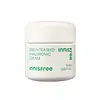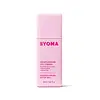What's inside
What's inside
 Key Ingredients
Key Ingredients

 Benefits
Benefits

 Concerns
Concerns

 Ingredients Side-by-side
Ingredients Side-by-side

Water
Skin ConditioningPropanediol
SolventGlycerin
HumectantStearyl Dimethicone
EmollientMethyl Trimethicone
Skin ConditioningPentaerythrityl Tetraethylhexanoate
EmollientButylene Glycol Dicaprylate/Dicaprate
EmollientGlyceryl Polymethacrylate
1,2-Hexanediol
Skin ConditioningPolymethylsilsesquioxane
Squalane
EmollientHydroxyethyl Acrylate/Sodium Acryloyldimethyl Taurate Copolymer
Emulsion StabilisingPolyglyceryl-3 Methylglucose Distearate
EmulsifyingCarbomer
Emulsion StabilisingHydrogenated Lecithin
EmulsifyingCholesterol
EmollientGlyceryl Stearate
EmollientTromethamine
BufferingSodium Stearoyl Glutamate
CleansingLactobacillus Ferment Lysate
Skin ConditioningHyaluronic Acid
HumectantPanthenol
Skin ConditioningAllantoin
Skin ConditioningSodium Metaphosphate
BufferingCamellia Sinensis Seed Oil
HumectantCetearyl Alcohol
EmollientXanthan Gum
EmulsifyingGlyceryl Caprylate
EmollientButylene Glycol
HumectantEthylhexylglycerin
Skin ConditioningSorbitan Isostearate
EmulsifyingSodium Hyaluronate
HumectantCamellia Sinensis Leaf Extract
AntimicrobialMadecassoside
AntioxidantLactic Acid
BufferingDextrin
AbsorbentTheobroma Cacao Extract
Skin ConditioningHydrolyzed Hyaluronic Acid
HumectantSodium Hyaluronate Crosspolymer
HumectantCamellia Sinensis Seed Extract
HumectantCeramide NP
Skin ConditioningTocopherol
AntioxidantPhytosphingosine
Skin ConditioningSodium Acetylated Hyaluronate
HumectantWater, Propanediol, Glycerin, Stearyl Dimethicone, Methyl Trimethicone, Pentaerythrityl Tetraethylhexanoate, Butylene Glycol Dicaprylate/Dicaprate, Glyceryl Polymethacrylate, 1,2-Hexanediol, Polymethylsilsesquioxane, Squalane, Hydroxyethyl Acrylate/Sodium Acryloyldimethyl Taurate Copolymer, Polyglyceryl-3 Methylglucose Distearate, Carbomer, Hydrogenated Lecithin, Cholesterol, Glyceryl Stearate, Tromethamine, Sodium Stearoyl Glutamate, Lactobacillus Ferment Lysate, Hyaluronic Acid, Panthenol, Allantoin, Sodium Metaphosphate, Camellia Sinensis Seed Oil, Cetearyl Alcohol, Xanthan Gum, Glyceryl Caprylate, Butylene Glycol, Ethylhexylglycerin, Sorbitan Isostearate, Sodium Hyaluronate, Camellia Sinensis Leaf Extract, Madecassoside, Lactic Acid, Dextrin, Theobroma Cacao Extract, Hydrolyzed Hyaluronic Acid, Sodium Hyaluronate Crosspolymer, Camellia Sinensis Seed Extract, Ceramide NP, Tocopherol, Phytosphingosine, Sodium Acetylated Hyaluronate
Water
Skin ConditioningGlycerin
HumectantCaprylic/Capric Triglyceride
MaskingPentaerythrityl Tetraethylhexanoate
EmollientNiacinamide
SmoothingCeramide NP
Skin ConditioningCholesterol
EmollientPhytosphingosine
Skin ConditioningPolyglyceryl-3 Methylglucose Distearate
EmulsifyingStearic Acid
CleansingOleic Acid
EmollientLactic Acid
BufferingTromethamine
BufferingCamellia Sinensis Leaf Extract
AntimicrobialHydroxyacetophenone
AntioxidantCetearyl Alcohol
EmollientCarbomer
Emulsion StabilisingXanthan Gum
Emulsifying1,2-Hexanediol
Skin ConditioningWater, Glycerin, Caprylic/Capric Triglyceride, Pentaerythrityl Tetraethylhexanoate, Niacinamide, Ceramide NP, Cholesterol, Phytosphingosine, Polyglyceryl-3 Methylglucose Distearate, Stearic Acid, Oleic Acid, Lactic Acid, Tromethamine, Camellia Sinensis Leaf Extract, Hydroxyacetophenone, Cetearyl Alcohol, Carbomer, Xanthan Gum, 1,2-Hexanediol
 Reviews
Reviews

Ingredients Explained
These ingredients are found in both products.
Ingredients higher up in an ingredient list are typically present in a larger amount.
1,2-Hexanediol is a synthetic liquid and another multi-functional powerhouse.
It is a:
- Humectant, drawing moisture into the skin
- Emollient, helping to soften skin
- Solvent, dispersing and stabilizing formulas
- Preservative booster, enhancing the antimicrobial activity of other preservatives
Camellia Sinensis Leaf Extract is derived from the leaves of the tea plant. Black tea, green tea, and oolong tea are all harvested from this plant.
This ingredient has many skin benefits:
This ingredient contains polyphenols, a strong antioxidant. Antioxidants help fight off molecules that damage skin cells.
On top of that, the antioxidants in green tea neutralize free-radicals from the sun. This gives the skin some extra UV protection, but should not replace sunscreen.
Many components of tea have anti-inflammatory properties.
Polyphenols and L-theanine help soothe the skin and reduce irritation. The caffeine in Camellia Sinensis Leaf Extract helps calm inflamed blood vessels.
Other compounds found in tea include: Vitamin Bs, linoleic acid, magnesium, calcium, iron, and zinc.
Research has shown both drinking Camellia Sinensis Leaf Tea and applying it to the skin can help boost skin elasticity and hydration. Studies also show using tea extract may reduce sebum, or oil, production.
Learn more about Camellia Sinensis Leaf ExtractCarbomer is a polymer of acrylic acid. Its main role is to create a gel consistency.
A high amount of carbomer can cause pilling or balling up of products. Don't worry, most products contain 1% or less of carbomer.
Ceramide NP is a type of ceramide.
Ceramides are intercellular lipids naturally found in our skin that bonds dead skin cells together to create a barrier. They are known for their ability to hold water and thus are a great ingredient for dry skin.
Ceramides are an important building block for our skin barrier. A stronger barrier helps the skin look more firm and hydrated. By bolstering the skin ceramides act as a barrier against irritating ingredients. This can help with inflammation as well.
If you would like to eat ceramides, sweet potatoes contain a small amount.
Read more about other common types of ceramides here:
Ceramide AP
Ceramide EOP
Cetearyl alcohol is a mixture of two fatty alcohols: cetyl alcohol and stearyl alcohol. It is mainly used as an emulsifier. Emulsifiers help prevent the separation of oils and products. Due to its composition, it can also be used to thicken a product or help create foam.
Cetearyl alcohol is an emollient. Emollients help soothe and hydrate the skin by trapping moisture.
Studies show Cetearyl alcohol is non-toxic and non-irritating. The FDA allows products labeled "alcohol-free" to have fatty alcohols.
This ingredient is usually derived from plant oils such as palm, vegetable, or coconut oils. There is debate on whether this ingredient will cause acne.
Due to the fatty acid base, this ingredient may not be Malassezia folliculitis safe.
Learn more about Cetearyl AlcoholCholesterol is a class of organic molecules called lipids. It helps hydrate your skin and is essential to having a healthy skin barrier.
Our skin naturally contains cholesterol in the outermost layer. Besides cholesterol, it also contains ceramides and fatty acids. Cholesterol makes up about 1/4 of your skin's outer layer and barrier. Your skin barrier is responsible for keeping allergens and microbes out. Having a healthy skin barrier is also responsible for keeping your skin firm and plump.
Our bodies use cholestrol to create vitamin D, steroid hormones, and more.
Learn more about CholesterolGlycerin is already naturally found in your skin. It helps moisturize and protect your skin.
A study from 2016 found glycerin to be more effective as a humectant than AHAs and hyaluronic acid.
As a humectant, it helps the skin stay hydrated by pulling moisture to your skin. The low molecular weight of glycerin allows it to pull moisture into the deeper layers of your skin.
Hydrated skin improves your skin barrier; Your skin barrier helps protect against irritants and bacteria.
Glycerin has also been found to have antimicrobial and antiviral properties. Due to these properties, glycerin is often used in wound and burn treatments.
In cosmetics, glycerin is usually derived from plants such as soybean or palm. However, it can also be sourced from animals, such as tallow or animal fat.
This ingredient is organic, colorless, odorless, and non-toxic.
Glycerin is the name for this ingredient in American English. British English uses Glycerol/Glycerine.
Learn more about GlycerinLactic Acid is another well-loved alpha hydroxy acid (AHA). It is gentler than glycolic acid but still highly effective.
Its main role is to exfoliate the surface of the skin by loosening the “glue” that holds dead skin cells together. Shedding those old cells leads to smoother, softer, and more even-toned skin.
Because lactic acid molecules are larger than glycolic acid, they don’t penetrate as deeply. This means they’re less likely to sting or irritate, making it a great choice for beginners or those with sensitive skin.
Like glycolic acid, it can:
Lactic acid also acts as a humectant (like hyaluronic acid). It can draw water into the skin to improve hydration and also plays a role in the skin's natural moisturizing factor (NMF) in the form of sodium lactate.
Studies show it can boost ceramide production to strengthen the skin barrier and even help balance the skin’s microbiome.
To get results, choose products with a pH between 3-4.
Lower strengths (5-12%) focus on surface exfoliation; higher strengths (12% and up) can reach deeper in the dermis (deeper, supportive layer) to improve skin texture and firmness over time.
Though it was originally derived from milk, most modern lactic acid used in skincare is vegan. It is made through non-dairy fermentation to create a bio-identical and stable form suitable for all formulations.
When lactic acid shows up near the end of an ingredient list, it usually means the brand added just a tiny amount to adjust the product’s pH.
Legend has it that Cleopatra used to bathe in sour milk to help reduce wrinkles.
Lactic acid is truly a gentle multitasker: it exfoliates, hydrates, strengthens, and brightens. It's a great ingredient for giving your skin a smooth, glowing, and healthy look without the harshness of stronger acids.
Read more about some other popular AHA's here:
Learn more about Lactic AcidPentaerythrityl Tetraethylhexanoate is an emollient that helps make your skin smooth and hydrated. It specializes in creating a non-oily and "wet" feeling on skin.
This ingredient comes from isostearic acid, a saturated fatty acid. It is a synthetic ingredient.
Phytosphingosine is a phospholipid naturally found in our skin as a building block for ceramides.. It helps moisturize, soothe, and protect skin.
Phytosphingosine contributes to your skin's natural moisturizing factor (NMF). The NMF is responsible for hydration, a strong barrier, and plasticity. Our NMF decreases with age. Increasing NMF leads to more healthy and hydrated skin.
Studies show products formulated with NMF ingredients help strengthen our skin's barrier. Having a healthy skin barrier reduces irritation and increases hydration. Our skin barrier is responsible for having plump and firm skin. It also helps protect our skin against infection, allergies, and inflammation.
Fun fact: Phytosphingosine is abundant in plants and fungi.
More ingredients that help boost collagen in skin:
Learn more about PhytosphingosinePolyglyceryl-3 Methylglucose Distearate is created from the diester of stearic acid and the condensation product of methylglucose and Polyglycerin-3.
As an emulsifier, it is used to bind ingredients together. Many ingredients, such as oils and water, separate naturally. Emulsifiers prevent them from separating to ensure even consistency in texture.
One of the manufacturer for this ingredient states it is vegetable-based. It is also claimed to be stable at both high and low temperatures.
This ingredient may not be safe for fungal acne. We recommend speaking with a professional if you have any concerns.
Learn more about Polyglyceryl-3 Methylglucose DistearateTromethamine helps balance the pH and improve the texture of a product. It is synthetically created.
As an emulsifier, Tromethamine prevents oil and water ingredients from separating. This helps stabilize the product and elongate a product's shelf life. Tromethamine also makes a product thicker.
Tromethamine helps balance the pH level of a product. Normal pH level of skin is slightly acidic (~4.75-5.5). The acidity of our skin is maintained by our glands and skin biome. Being slightly acidic allows our skin to create an "acid mantle". This acid mantle is a thin barrier that protects our skin from bacteria and contaminants.
Oral Tromethanmine is an anti-inflammatory drug but plays the role of masking, adding fragrance, and/or balancing pH in skincare.
1,3-Propanediol, 2-amino-2-(hydroxymethyl)-
Learn more about TromethamineWater. It's the most common cosmetic ingredient of all. You'll usually see it at the top of ingredient lists, meaning that it makes up the largest part of the product.
So why is it so popular? Water most often acts as a solvent - this means that it helps dissolve other ingredients into the formulation.
You'll also recognize water as that liquid we all need to stay alive. If you see this, drink a glass of water. Stay hydrated!
Learn more about WaterXanthan gum is used as a stabilizer and thickener within cosmetic products. It helps give products a sticky, thick feeling - preventing them from being too runny.
On the technical side of things, xanthan gum is a polysaccharide - a combination consisting of multiple sugar molecules bonded together.
Xanthan gum is a pretty common and great ingredient. It is a natural, non-toxic, non-irritating ingredient that is also commonly used in food products.
Learn more about Xanthan Gum